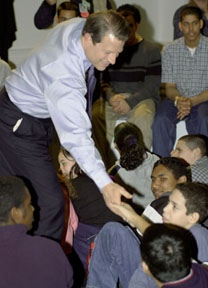| Election
2000 Coverage
Never
Mind the Bollocks The
Battle of Philadelphia Working
It Editorial Cleaning
Up Why
I'm Voting for Nader ...
...
And Why I'm Not Dumped An
Environmental President Three's
Company Editorial Marching
On Party
Palace Stupid
Tuesday What
Women Want Ralph
Really Runs How
to Deal with Gore Ralph
Really Runs Editorial On
the Fence The
First Stone Gush
vs. Bore Free
Ride
Cash and Carry Fair
Weather Friends More
Marketplace Medicine New
Labor, Old Politics Bradley
Courts the Black Vote Changing
Primary Colors The
Great Right Hope Money
Money Money! |
Fair-Weather Friends
Candidates court the Latino vote
By Juan Gonzalez
Back in 1996, Republican Party national leaders sought to outdo each other with draconian federal and state laws that targeted the country's immigrant population, accompanied with television campaign ads that portrayed our borders being overrun by undocumented and crime-prone Latinos. In his run for president, party standard-bearer Bob Dole supported cutbacks in federal benefits to even legal immigrants, and he urged making English the nation's official language.
What a difference four years make.
|
|
|
Few
candidates have touched on the |
This time around, we've heard none of the same immigrant bashing from White House hopefuls on the Republican side. It seems party leaders have learned a lesson from the enormous backlash by Latino voters in the past few years, when millions who had remained permanent residents for years opted to become citizens to protect themselves from Republican-engineered cut-offs in federal and state benefits. Those new citizens immediately registered as Democrats and voted to unseat anyone who had targeted them.
Bill Clinton garnered only 61 percent of the Latino vote in 1992, but that figure rose to 72 percent in 1996, a clear indication that most Hispanics regarded the Republicans as anti-Latino. It hasn't always been that way. Back in 1980, Ronald Reagan got 40 percent of the Latino vote nationwide. But lately even in Florida, where the Cuban immigrant community has always been faithfully Republican, the Democrats have made big headway: Clinton grabbed 44 percent of the Florida Cuban vote in 1996, compared to Dole's 46 percent.
Part of George W. Bush's appeal to Republican Party operatives is the possibility that he will be able to siphon off from the Democrats that big share of Latino voters Reagan once enjoyed. "These guys do an about-face and now they're all trying to campaign in Spanish," says Juan Andrade, president of the Chicago-based United States Hispanic Leadership Institute.
But we are not talking only percentages here. Substantial numbers are at stake. Even as most Americans are increasingly being turned off by electoral politics, Latinos are being turned on. Between 1992 and 1996, the number of votes cast decreased by more than 9 million among non-Hispanic whites and decreased by 15,000 among blacks. But votes increased by a whopping 690,000 among Latinos.
Today's "enlightened" Republicans--represented by Bush, New York Mayor Rudolph Giuliani and Los Angeles Mayor Richard Riordan--are working overtime to be seen as pro-immigrant. The presidential candidates have to work fast because the front-loaded primary schedule means that the big states where most Latinos reside are voting early. On March 7, California, New York, Connecticut, Massachusetts, Maryland and Ohio will be among 11 states holding primaries. Each of these states has a huge Latino electorate. California's, of course, is the biggest prize, and New York is not far behind. But Massachusetts and Connecticut have sizeable Latino populations in each of their major cities. Those primaries will be followed the next week by votes in Texas and Florida. Most Latinos in the country will have had a chance to express their presidential preferences by March 14.
Yet other than producing commercials in Spanish, few of the candidates have touched on the issues most important to Latinos. Gore has come closest with his repeated calls for raising the minimum wage--something that disproportionately affects immigrant workers--and with his emphasis on greater spending for education.
But we have heard nothing in presidential debates so far about the devastating economic crisis in Latin America that is fueling more immigration to this country, the massive uproar in Puerto Rico over the Navy's bombing practice in Vieques, police abuse and killings and racial profiling in black and Latino inner-city neighborhoods, the rise of the digital divide in an increasingly technology-driven economy, the growth of sweatshop labor, or the rampant exploitation of immigrant labor in much of white suburban America. Nor have we heard any of the candidates tackle a question that, thanks to the national uproar over the fate of 6-year-old Elian Gonzalez, has once again been thrust into the spotlight: When will our country end this irrational blockade of Cuba that has been condemned by virtually every nation in the world?
Maybe some hardy reporters will force the candidates to respond to a few of these questions during the next few weeks, but don't bet on it. National political reporters, even those on the left, are overwhelmingly white and generally more ignorant about the nation's 30 million Latinos than the candidates.
Juan Gonzalez is a contributing editor of In These Times.
|
In These Times ©
2000
Vol. 24, No. 7 |

